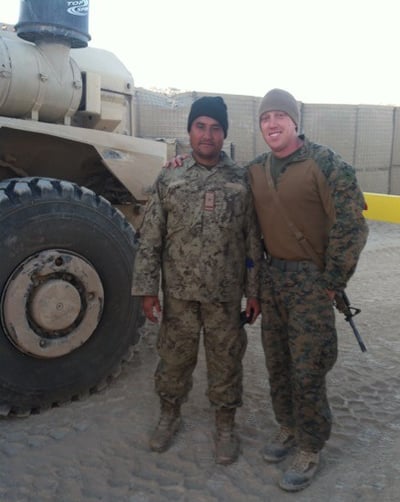
In honor of Memorial Day, we are sharing this post by Tom Williams, a former infantry officer in the US Marines, who recently completed HBX CORe. He currently works for a nonprofit that honors fallen service members and was recently admitted to Columbia Business School. Tom originally shared his story on the Military to Business Blog. Military to Business is a consulting service that helps military and non-traditional applicants gain admission to top graduate schools. Click here to see the original post.

One of the obvious disadvantages we face when leaving the service, whether to pursue an MBA or enter the workforce directly, is our lack of experience and unfamiliarity with the language of business. Certainly these shortfalls are expected, but that learning curve can be a steep one, made all the more challenging by the already-fast paced environment of business school and potential culture shock of going from the battlefield to the classroom.
Before I dive in, a little bit about me: I commissioned into the Marine Corps in 2011 and served as an infantry officer on the West Coast. After deployments to Eastern Europe and Afghanistan, I felt I’d accomplished many of the goals I set out to achieve. We all have our own reasons for hanging up the uniform, and mine revolved around the desire to lead and achieve in a different context outside the military. Coming to this conclusion, I realized, like many on this site, that an MBA was the surest way to accelerate my growth toward this end. As a social science major in college, I also knew that my lack of having studied anything business-related represented, to me, a gap in my background. I’d never learned to read a financial statement or how to interpret a supply and demand curve. Though I was certain there were others in my situation, and it wasn’t necessarily grounds for rejection, I decided to begin researching opportunities that would do two things: build a foundation of business knowledge; and demonstrate to an admissions staff that I was committed to my academic goals.
Many of the obvious choices came to mind. I could brush up through KhanAcademy or take a Coursera class. However, neither of these options came with the requisite weight that would demonstrate enough of a commitment. I needed something with brand equity, something that could legitimately be placed on a resume. Stanford offers some courses, but most require two years to complete and are cost-prohibitive at that. Finally, I stumbled upon Harvard Business School’s Credential of Readiness (CORe), offered by HBX.

HBX is Harvard Business School’s digital classroom. CORe is designed for those who are looking to learn the language of business. The 10-week course, taught by HBS professors, requires anywhere from 12-15 hours of work per week, and teaches the fundamentals of business analytics, economics for managers and financial accounting. I was seriously impressed with the platform, the learning curve and the interactive aspect of the course.
What was most remarkable was the platform and learning model. It was as interactive and social as any “online course” could be. In fact, a large part of the grade depends on your participation in group discussions and willingness to help your peers who may have questions about the concepts, complete with a private Facebook group. Built around HBS’ case-based learning model, the platform creates an active learning environment in which you will spend no more than a few minutes doing the same thing. Upon completion of the course, there is a final exam that must be taken at a local testing center.
While the course is not meant to replace a full-time MBA program, it is a primer on the fundamentals that will serve as a foundation upon which MBA academics will be built. Now, when reading the WSJ, I no longer feel like I’m studying a foreign language. I understand concepts like network effects and market equilibrium, and can read a balance sheet or statement of cash flows. I fully intend to bring my notes and flashcards to business school with me.
Finally, it is worth discussing the cost of this course. HBX offers CORe for $1,800. However, they offer a significant discount to US military veterans, reducing the price to $700, well worth it in my opinion.
Whether you are looking to transition straight to the workforce or are pursuing an MBA, HBX CORe is worth considering. For those in the latter group, if you’ve already been accepted into an MBA program, CORe would be an ideal course to take just prior to starting school. If you’re still in the process of applying to MBA programs, you may think about using CORe like I did, as a way to learn the language of business while demonstrating legitimate dedication toward your academic goals.







